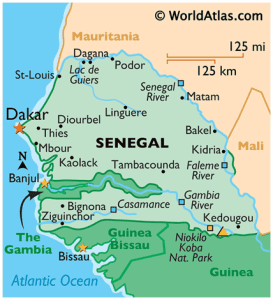TAG: GS 2: INTERNATIONAL RELATIONS
THE CONTEXT: The recent surge of protests and political turmoil in Senegal has brought the West African nation into the global spotlight.
EXPLANATION:
- Triggered by the postponement of Presidential elections and subsequent clashes between opposition leaders and riot police, the crisis raises questions about the nation’s democratic legacy.
Background to the Crisis
- President’s decision to postpone the Presidential elections scheduled for February 25 has been met with widespread discontent.
- The grounds for the delay revolve around a dispute between the National Assembly and the Constitutional Council regarding the selection of candidates.
- The contentious decision has effectively granted President an additional 10 months in office, resetting the election date to December 15.
- Opposition legislators, expressing their fury over the deferred elections, were physically removed from the National Assembly by riot police.
- The manner in which the government-packed house facilitated the postponement intensified the opposition’s grievances, leading to heightened tensions across the country.
Current Unrest and Recent History
- The ongoing unrest mirrors the violent clashes witnessed in Dakar in the preceding year, deemed the worst in decades.
- Amnesty International reported over 20 lives lost and hundreds injured during the 2021 protests.
- The violence erupted following the imprisonment of leading opposition candidate, known for his anti-corruption stance and resistance against French influence.
- In January of the current year, the Constitutional Council barred a leading opposition candidate from participating in the Presidential race, intensifying the opposition’s dissatisfaction.
- President’s claim of eligibility for a third term, based on a reinterpretation of constitutional timelines, has further fueled speculation about his political maneuvering.
Senegal’s Democratic Record
- Historical Democratic Stability
- Senegal, until recent events, held a distinguished record as the only coup-free West African nation.
- Since gaining independence in 1960, the country has experienced smooth transfers of power under a multi-party democratic system, distinguishing it from its neighbors.
- Regional Leadership in Democracy
- President, instrumental in ECOWAS missions for democratic transitions, played a crucial role in the Gambia’s 2017 intervention to remove Yahya Jammeh.
- Senegal’s historic commitment to promoting democratic values in the region has faced a significant setback with the current crisis.
Implications and Regional Context
- A Break from Regional Stability
- Senegal’s decision to delay elections and the subsequent unrest marks a departure from the country’s traditional role in promoting regional stability.
- As military takeovers grip neighboring nations, Senegal’s deviation raises concerns about the potential regression of democratic values in the region.
- Call for International Reconsideration
- The return of military dictatorships in African countries during the 2020s prompts a reconsideration of the traditional role of global powers in the region.
- Senegal’s pivotal position in advocating for democracy in West Africa is now under scrutiny.
Senegal:
- Senegal is a West African country that shares its northern border with Mauritania, its eastern border with Mali, its southern border with Guinea and Guinea-Bissau, and its western border with the Atlantic Ocean.
- To the northwest, it surrounds the small country of The Gambia, creating an enclave around the Gambia River.
- Senegal spans an area of approximately 196,712 km2 (75,951 mi2).

Conclusion
- The unfolding crisis in Senegal, characterized by political postponement, protests, and the erosion of democratic norms, poses a formidable challenge to the nation’s historical legacy.
- As the international community observes, the outcome of this crisis may not only impact Senegal’s democratic standing but also reverberate across a region grappling with the resurgence of authoritarian rule.
- The need for a nuanced and strategic approach to address the complexities of the situation is paramount.




